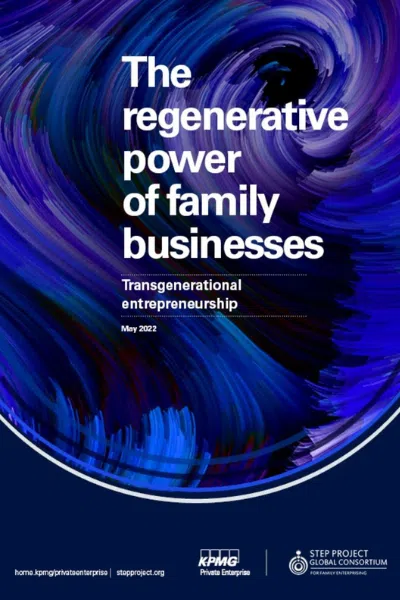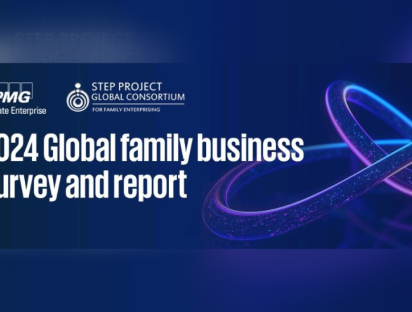Annual report from KPMG Private Enterprise and STEP Project Global Consortium highlights how emotional attachment to one’s organization and the ability of next-gens to take risks and experience life outside the family business are critical elements of future business success.
A Global Family Business Report from KPMG Private Enterprise and the STEP Project Global Consortium reveals that the sustained performance of family businesses can be attributed to several characteristics and next-generation leadership skills unique to their business models.
“The regenerative power of family businesses – Transgenerational entrepreneurship”, brings together insights from 2,439 CEOs and other leaders from top family businesses across 70 countries and territories, illustrating the common factors that make up the formula for family business resilience and regeneration: a strong entrepreneurial orientation, emotional attachment to their business and ambitious next-generation leadership seeking new experiences beyond the family business.
Among the top findings of the report: Next-generation successors are setting out on other career paths before returning to the family business, often using small amounts of family capital to help them learn and take risks. This approach is ultimately shown to be a contributor to long-term outperformance among the cohort of family businesses surveyed in the report.
Potential next-generation successors are being educated on how to take calculated risks on their own, which speaks to one of three key elements that today’s family businesses are relying on for success: entrepreneurial orientation. The KPMG Private Enterprise and STEP Project Global Consortium report found that the main keys family businesses are using to unlock their regenerative capabilities are:
- Entrepreneurial orientation: This is a unique asset and essential for innovation and growth from generation to generation. The importance of keeping the founder’s entrepreneurial spirit alive is a major contributor to their continuous innovation mindset. Potential next-generation successors are being educated on how to take calculated and responsible risks and make judgments on their own, with small amounts of family capital enabling them to learn from firsthand experiences.
- Socioemotional wealth: The family’s control and influence allows for quick decision making, and their “socioemotional wealth” is viewed as an essential endowment — one that the family values and protects. For many of the respondents, this is a measure of performance beyond financial wealth and one that is often difficult to replicate in non-family businesses.
- Motivational leadership: Entrepreneurialism and socioemotional wealth go hand-in-hand as competitive differentiators, further strengthened by the impact of a transformational or charismatic leader.
Andrea Calabrò, Global Academic Director, STEP Project Global Consortium, says:
“Success in family businesses is defined by both financial and non-financial objectives, such as control, transgenerational succession, social capital, emotional connection to the firm and reputation. Keeping and accumulating socioemotional wealth is an important part of a family firm’s success. The level of socioemotional wealth can change as family firms transition from one generation to the next, which is precisely the time to ensure the family’s control and influence, identification and emotional attachment to the firm are transitioned as well.”
Performance profiles: From peak performers to underperformers
The report also found that a family business’s leadership style can influence its performance. Based on inputs from the survey respondents, KPMG Private Enterprise and The STEP Project Global Consortium developed profiles of four family business types — from top performers to the most underperforming businesses — highlighting factors that have contributed to their regenerative power and financial, family and social results from generation to generation.
Key findings from the family business profiles are:
- Higher performance from entrepreneurial and diverse orientations: Family businesses with a high level of entrepreneurial orientation, diversity and a charismatic leadership style showed higher financial and non-financial (social capital, emotional connection, etc.) performance than others. A commitment to continuous innovation and strong emotional attachments was also seen among the top performers.
- Motivational leadership styles take the lead: The transformational leadership style — where leaders are changing basic values, beliefs and attitudes in an effort to motivate their “followers” to do more and perform beyond expectations — was the overall preference of family business CEOs across all regions, followed by the charismatic leadership style.
- Motivational leadership can help drive more progress: The report found that motivational leadership can be ultimately rewarded with good financial, social and environmental progress, while also helping to build and foster familial loyalty and identification with the business.
Tom McGinness, Global Leader, Family Business, KPMG Private Enterprise, KPMG International, says:
“According to the report findings, when both the level of entrepreneurial orientation and emotional attachment to the business are high, every aspect of the company’s performance is also high. Even though the family business success formula is based on their unique characteristics, there are also many lessons and practices for non-family businesses to take away. Adopting a holistic view of strategy and performance and giving equal weight to the business, employees and social outcomes is a great starting point. Every type of business can benefit from taking a moment to step back and look at their performance with a fresh mindset.”
For press requests, please contact:
Daniel Caines
KPMG International
+44 7732 400262
daniel.caines@kpmg.co.uk





